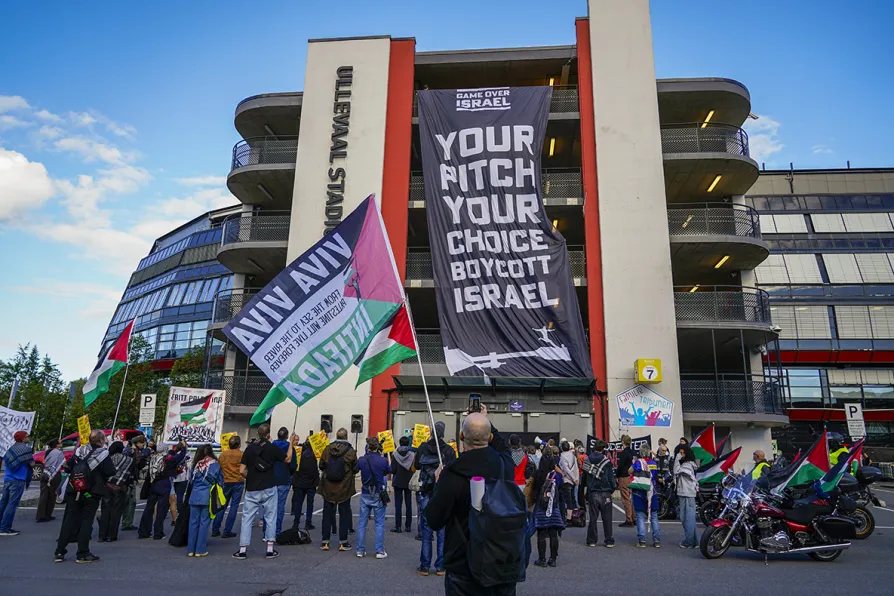Despite damning findings, Israel remains in World Cup contention - raising questions over football’s role in global accountability, writes JAMES NALTON

 The Action Group for Palestine demonstrates as a reaction to the international football match between Norway and Israel taking place next month, outside Ullevaal Stadium in Oslo, Norway, September 17, 2025
The Action Group for Palestine demonstrates as a reaction to the international football match between Norway and Israel taking place next month, outside Ullevaal Stadium in Oslo, Norway, September 17, 2025
LAST WEEK, a United Nations commission found that Israel has committed genocide against Palestinians in the Gaza Strip. This led to further calls for Israel to be banned from international sporting events, including from Uefa competitions and, by extension, from the upcoming Fifa World Cup.
The Israel men’s national team are currently involved in the Uefa qualification section and still have a chance of reaching the World Cup, even though Norway and Italy are the two teams expected to qualify from their group.
Israel have nine points and three games remaining. Those matches are against group leaders Norway, who are currently in the automatic qualification spot with 15 points, and second placed Italy, who are in the playoffs spot on nine points with a game in hand. Their final game of qualification is against Moldova, who are yet to win and have conceded 25 goals in five games.
One of the issues that has meant Israel have so far not faced similar sanctions to Russia is that teams, or more specifically their national associations, were still agreeing to play against them.
Russia were banned from international football in 2022 largely because teams refused to participate in games involving them, which then meant the game’s authorities had to make a decision.
There could now be a similar situation with Israel, following the UN findings, which means nations and governing bodies now have more official backing if they want to make such a move. The UN has insisted that they should.
“Sports must reject the perception that it is business as usual,” said a panel of UN experts in a statement on Tuesday.
“Sporting bodies must not turn a blind eye to grave human rights violations, especially when their platforms are used to normalise injustices.”
One issue with banning a nation from participating in various sporting events due to the actions of its leaders is that it can unfairly affect some of the athletes. With this in mind, the UN experts noted that individual players should not be targeted.
“We are clear that the boycott must be addressed to the state of Israel and not to individual players,” they said.
“We have always maintained that individuals cannot bear the consequences of the decisions their government makes, so there should be no discrimination or sanctions against individual players because of their origin or nationality.
“National teams representing states that commit massive human rights violations can and should be suspended, as has happened in the past.”
The news of Israel potentially being banned from participating in the 2026 World Cup has been met with resistance from the government of one of the tournament’s three host nations, the United States.
“We will absolutely work to fully stop any effort to attempt to ban Israel’s national soccer team from the World Cup,” a US State Department spokesperson said in a statement released to the media.
This comes on the back of more potential interference in World Cup from US President Donald Trump, who has threatened to remove some cities’ hosting rights if they don’t comply with his policies on immigration and crime.
Trump was asked specifically about cities such as Seattle and San Francisco, which are both hosting World Cup games, and whether games there would be moved if they push back against his immigration and deportation policies.
“They’re run by radical left lunatics, and they don’t know what they’re doing,” Trump said of those cities, which both have Democratic mayors.
“It will be safe for the World Cup, but if I think it isn’t safe, we’ll move it into a different city, absolutely.
“If any city we think is going to be even a little bit dangerous for the World Cup, or for the Olympics, when they have Olympic overthrow, but for the World Cup in particular, because they’re playing in so many cities, we won’t allow it to go there, we will move it around a little bit, but I hope that’s not going to happen.”
Mostly of its own making, Fifa has its hands full with this World Cup, which will be politically charged from numerous sources, not least one of the host nations.
The UN aimed one of their statements at Fifa specifically, insinuating that even before the UN findings, governing bodies have been too slow to act.
“Once again, we urge Fifa to stop legitimising the situation arising from Israel’s unlawful presence in the Occupied Palestinian Territory,” they said.
“There is a legal and moral imperative to take every measure possible to end the genocide in Gaza now.”
The truth is that the UN, the countries themselves, and their governments have waited far too long for those legal and moral imperatives to kick into action from their side. And, as shown by a recent statement from the United States government, some are even still backing Israel’s actions, or providing them with arms, or offering strategic support.
Given the United States’ bans and proposed bans on travel to it from certain countries, and the other political considerations emerging each month, a situation has been reached ahead of this World Cup where looking at which teams will qualify from their respective regional confederations has become as much about politics as sport.










